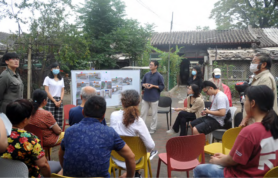Beijing: The Role of Community Planners in Collaborative Planning
Cities such as Beijing, Shenzhen, Shanghai, and Chengdu have implemented the community planner policy, which is one of the most important institutional responses for addressing the increasingly diverse interests and complex conflicts in urban affairs at the neighborhood level. It aims to facilitate the effective implementation and contextualization of upper-level planning and policies, since public sectors at the local level lack planning expertise. Community planners are crucial actors, who facilitate, moderate, and mediate collaborative processes. Our research explores the complex roles of community planners in collaborative processes, and the influence of specific local institutional contexts on these roles.

Collaborative planning practices led by community planners (photo from Xing Zhao)
Community planners are usually third-party professionals independent of direct stakeholders, such as governments, businesses, and communities. Community planners voluntarily match a local administrative unit (street, community cluster, town, and village) and enter contracts with them under the endorsement of the district governments, either for specific projects or for long-term planning efforts. They are expected to coordinate different stakeholder interests within specific communities or community clusters.
Although the engagement of community planners can have progressive results, their abilities to realize this potential are strongly influenced by the policy, as well as socio-cultural and political contexts, in which planning processes take place. Additionally, rather than neutral actors, planners have specific interests and values that influence their behaviors and actions in planning practices. Therefore, it is essential to understand the role of community planner in collaborative planning practices.

